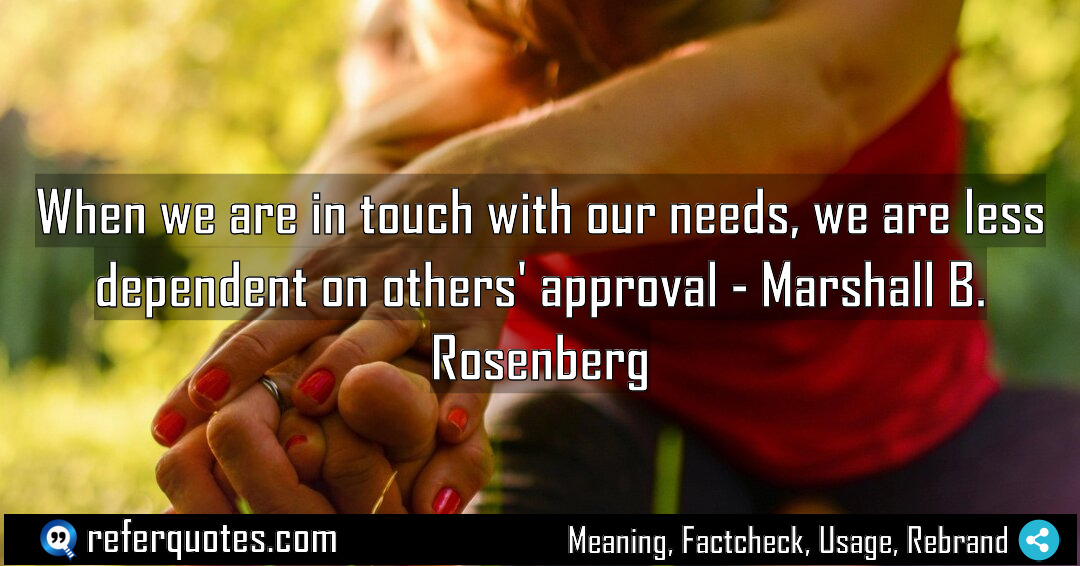
When we are in touch with our needs, we stop handing our emotional car keys to other people. It’s a game-changer for your confidence and relationships. You start making decisions from a place of internal clarity, not external validation.
Share Image Quote:
Table of Contents
Meaning
This quote means that self-awareness of your own core needs is the ultimate antidote to seeking constant approval from others.
Explanation
Let me break this down for you. For years, I saw people—clients, colleagues, even myself—getting tangled up in this web of “what will they think?” It’s exhausting, right? Rosenberg’s genius here is in flipping the script. He’s saying that the moment you get crystal clear on what you truly need—not just what you want, but the fundamental human need for respect, for peace, for connection, for growth—something incredible happens. The opinions of others, they just… lose their charge. They don’t have the same power over you. You’re no longer a puppet waiting for someone else to pull the strings because you’re the one holding your own strings. It’s not about becoming selfish; it’s about becoming self-referenced.
Quote Summary
Reading Level70
Aesthetic Score70
Origin & Factcheck
This is straight from Marshall B. Rosenberg’s 1999 book, Nonviolent Communication: A Language of Life. It’s a cornerstone of the NVC framework he developed, primarily in the United States. You sometimes see similar sentiments floating around in self-help circles, but this specific, powerful phrasing is 100% Rosenberg.
Attribution Summary
Where is this quotation located?
| Quotation | When we are in touch with our needs, we are less dependent on others' approval |
| Book Details | Publication Year: 1999; ISBN: 9781892005038; Last edition: 3rd Edition (2015); Number of pages: 264. |
| Where is it? | Chapter 9: Connecting Compassionately with Ourselves, Page 155 (2015 edition) |
Context
In the book, this isn’t just a feel-good statement. It’s a practical tool. He places this idea right in the middle of teaching how to observe without judgment and to connect with our feelings to uncover the needs beneath them. It’s the pivotal moment where you stop being a victim of circumstance and start being an active participant in your own emotional life.
Usage Examples
So how does this look in real life? Let me give you a couple of scenarios.
First, think about a manager who’s afraid to give constructive feedback. If their core need is for a harmonious and effective team, they can frame the feedback from that place, instead of from a fear of being disliked. The need for team success outweighs the need for personal approval.
Or a creative professional stuck in revision hell because the client keeps asking for changes. If they connect with their need for integrity in their work and for efficient use of their time, they can have a different conversation—one focused on meeting those needs, rather than just pleading for approval of their original design.
Honestly, this is for anyone who has ever felt that pang of anxiety when they hit “post” on social media or hesitated before speaking up in a meeting. It’s a universal key.
To whom it appeals?
Share This Quote Image & Motivate
Motivation Score85
Popularity Score78
Shareability Score75
FAQ
Question: Does this mean I should just ignore what other people think entirely?
Answer: Great question, and no, not at all. It’s about shifting your dependence. You can still listen to and consider others’ perspectives, but your primary source of validation comes from within, from your own clarity. It actually makes you a better listener because you’re not just anxiously waiting for your turn to speak or to be validated.
Question: How do I even figure out what my “needs” are?
Answer: Start with your feelings. Frustration? Probably an unmet need. Resentment? Definitely an unmet need. Rosenberg has a whole list of universal human needs—things like autonomy, community, safety, meaning. When you feel a strong negative emotion, ask yourself: “What important need of mine is not being met right now?” The answer is your roadmap.
Question: Isn’t this just a fancy way of saying “be more selfish”?
Answer: I get why you’d think that, but it’s the opposite. When you’re dependent on approval, your actions are often about manipulating a response from others. When you’re connected to your needs, your actions are authentic. You can show up more genuinely in relationships and contribute from a place of fullness, not neediness. It’s the difference between taking from others and sharing with them.
Similar Quotes
You know, “The more we are able to connect with what we are observing…” is really the whole game. It’s not fluffy self-help; it’s a practical framework for getting what…
When we are internally connected to what we need, it fundamentally shifts our decision-making process from a place of reaction to one of clarity. It’s the difference between lashing out…
We can only make requests, not demands if we want genuine connection instead of control. This simple shift in language transforms relationships by creating mutual respect and understanding. Table of…
You know, the more we are connected to our feelings, the more we stop fighting ourselves and start making choices that genuinely serve us. It’s like having an internal compass…
Track decisions, not discussions is a game-changing principle for productive meetings. It cuts through the noise and focuses on what truly matters: the outcome. I’ve seen teams transform overnight by…
